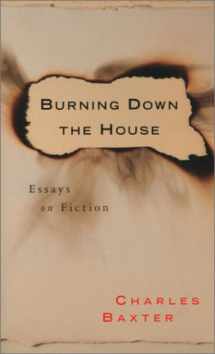
Burning Down the House: Essays on Fiction
Book details
Summary
Description
In this book, Baxter offers several sharp, articulate, and provocative essays that examine the many forces currently shaping contemporary American fiction. As noted in The Washington Times: "What elevates this collection from the status of technical manual (which it also is, and a brilliant one at that) is Mr. Baxter's rare ability to gauge the capacities of fiction for conveying an image not only of individual existence, but of the characteristic feel of a time, a culture, a way of life."
Charles Baxter is also the author of the novels First Light and Shadow Play, the story collections Harmony of the World, Through the Safety Net, A Relative Stranger, and Believers, and Imaginary Paintings, a book of poetry. He was recently honored with an Academy Award in Literature from the American Academy of Arts and Letters and currently teaches at the University of Michigan in Ann Arbor.
In this book, Baxter offers several sharp, articulate, and provocative essays that examine the many forces currently shaping contemporary American fiction. As noted in The Washington Times: "What elevates this collection from the status of technical manual (which it also is, and a brilliant one at that) is Mr. Baxter's rare ability to gauge the capacities of fiction for conveying an image not only of individual existence, but of the characteristic feel of a time, a culture, a way of life."
"The most pleasurable and instructive book on the craft since John Gardner's The Art of Fiction."—City Pages
"Brilliant . . . Baxter displays his characteristic wit and intelligence as he muses about the influences of culture and politics on the art of storytelling."—Ploughshares
"[This book] is a pleasure to read, and it performs an important fuction—by mucking around in the problems that plague contemporary fiction, Burning Down the House may spur both readers and writers first to a recognition of guilty complicity and then to constructive thought."—The New York Times Book Review
"Readers are rewarded with great one-liners, thoughtful ruminations on the state of literature, and plenty of brush fires that continue burning long after the book is closed."—The San Francisco Bay Guardian
"I've heard Baxter talk at Warren Wilson . . . He's the smartest fiction theorist going."—Alan B. Williamson, University of California, Davis
"Burning Down the House by Charles Baxter is one of the finest books on craft that I've yet to read. I regularly urge my fiction writing students to add it to their personal libraries."—Carol Zoref, Sarah Lawrence College
"[Baxter is] an expert, as uninterested as it's humanly possible to be in self-display, illuminating what he loves. [This book is] both lively and vital, no easy marriage, no small feat. I had read nearly all the essays before, some of them five or six times, but they still were fresh indivually and made something new as a whole. What Baxter does in this book is to locate a significance of fiction in contemporary life (not just its significance for him, but certainly that), and to describe some of the best technique for achieving this significance, embodying it. His favored strategy in these essays is debunking, the melodrama and epiphany essays being the most obvious examples. . . . It's good work, morally good work, as well as excellent work as criticism and propaedeutic. It is also simply a pleasure to have this person's company-in-print-in this book, a lifetime of large learning worn lightly and given freely."—Michael Ryan, University of California, Irvine


We would LOVE it if you could help us and other readers by reviewing the book
Book review



